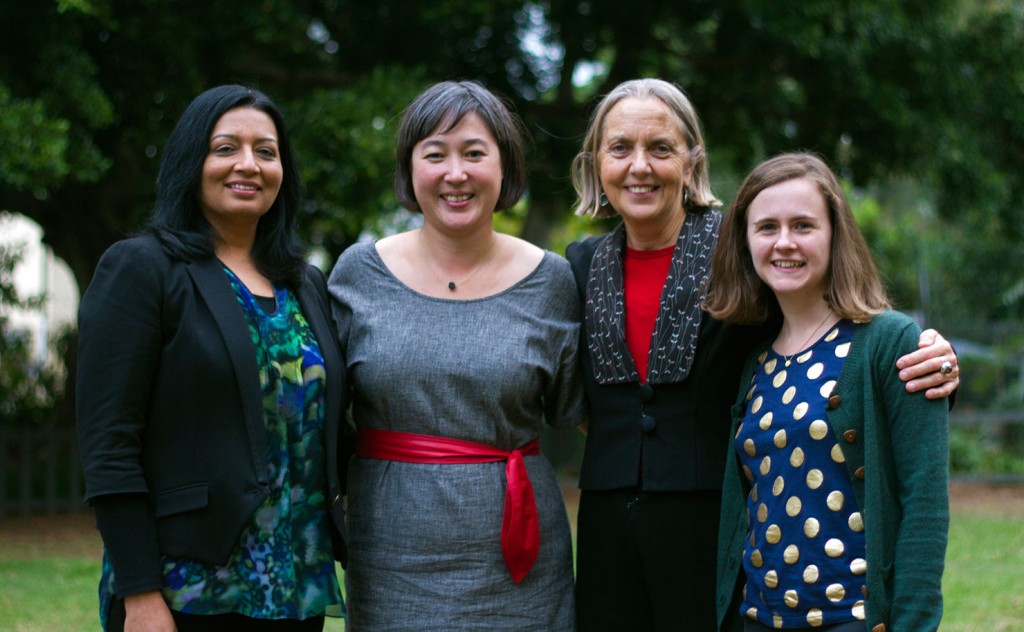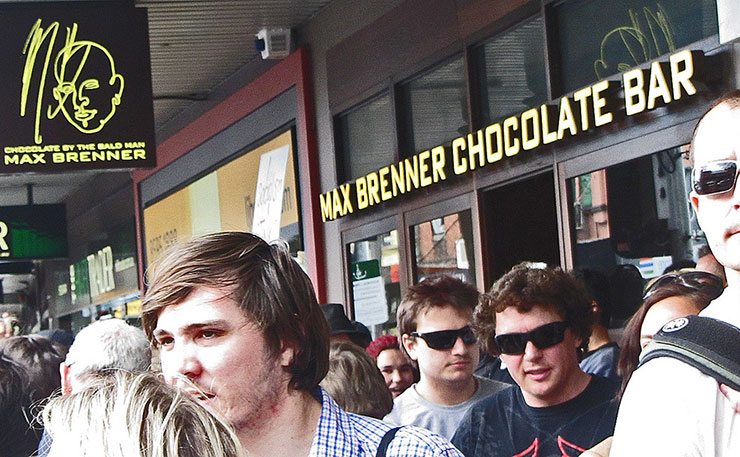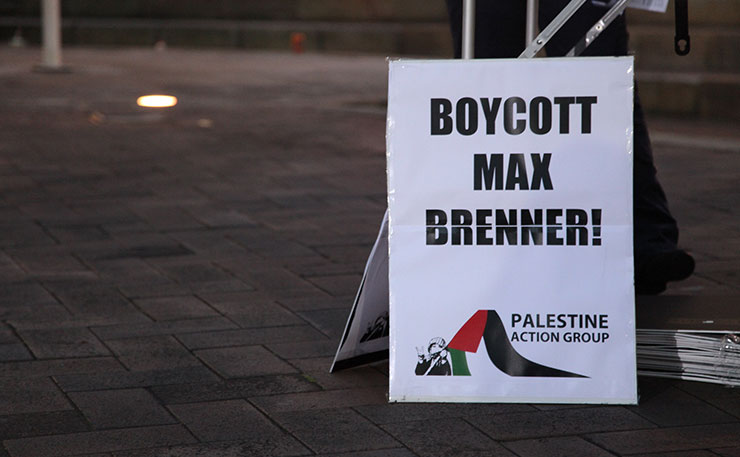Once a burning issue, BDS has now receded from the national stage, though a small group continue to pursue a boycott of Israel as Palestinian advocates watch from afar. Max Chalmers reports.
It might seem a distant concern, but Omar Barghouti likes to keep an eye on the Israel-Palestine debate in Australia.
“I try as much as possible to follow and at times engage in the debate on BDS in Australia, as it is one of the most reactionary and anti-democratic spaces in the west for Palestine solidarity activists and movements,” Barghouti said, in an interview conducted via email.
A Palestinian advocate lauded by Amnesty International as a human rights defender, Barghouti’s critics – such as Monash University associate professor Philip Mendes – dismiss him as a “fundamentalist” and “arch nationalist”. And while his name means little to most Australians, the Boycott, Divestment, and Sanctions (BDS) campaign he co-founded has proved a lightning rod for controversy in a country reluctant to get worked up over foreign affairs.
Launched in 2005, BDS invokes the anti-apartheid campaign of the previous century and calls for a multi-faceted boycott of Israel. It makes three demands; that Palestinian refugees be allowed to return to their homes; that the occupation of lands seized in 1967 ends; and that Arab-Palestinians living in Israel are granted “full equality”.
In December 2010, Marrickville Council – a local government body responsible for a left-leaning patch of inner-city Sydney – took up the call, and committed to “boycott all goods made in Israel and any sporting, academic institutions, government or institutional cultural exchanges”.
As the issue gained traction, advocates started picketing and protesting at Max Brenner outlets, a chain of chocolate stores they accused of supporting Israeli troops. Then, in late 2012, Australian academic Jake Lynch declined to assist Israeli professor Dan Avnon apply for a fellowship at the University of Sydney, citing BDS. While involving a relatively small number of players, the trifecta of controversies provoked raucous debate, inspired lawsuits, and eventually drew comment from the most powerful political actors in the country.
The Pushback
When the BDS campaign first appeared in Australia, critics were angered by its form as well as its content. They argued its rhetoric ignored the complexities of the situation in the Middle East. Some compared BDS directly to the boycotting and ransacking of Jewish businesses in Nazi Germany, and others said its promoters were at best naive, and at worst anti-Semites.
Conservative newspapers were happy to carry the more extreme of those charges and local skirmishes were brought to national attention. As the pressure piled on, those on the side of BDS could find few voices to make their case. They seemed shell-shocked.
The Marrickville Council motion endorsing BDS had passed with a 10 – 2 majority: just four months later, it reversed the decision by a vote of 8 – 4. The NSW Greens, central players in the Marrickville saga, appeared to suffer at the 2011 state election as a result. By the end of the year they had also dropped their support for BDS.

According to Philip Mendes, who co-authored the book Boycotting Israel is Wrong, the campaign had a “very negative” impact on Australian Jewish communities. It inspired “a feeling that the community is under attack from bigots”, and damaged “already tenuous relations between Australian Jews and Palestinians or Arabs more generally”.
Many opponents now feel the issue has been settled for good.
Peter Wertheim, the executive director of the Executive Council of the Australian Jewry, said the campaign against Max Brenner was “universally condemned and derided”.
“I would go so far as to say that it was a free gift to the cause of Zionism,” he said.
Dan Avnon, now the incoming Chair of the Department of Political Science at the Hebrew University in Jerusalem, found himself in the middle of the fray after Jake Lynch declined to assist his fellowship bid. Lynch’s polite rebuff came as a surprise to Avnon, though he successfully applied for the fellowship anyway and spent what he recalls as an enjoyable spell in Australia.
“I have scores of emails from Australian politicians and from ordinary people across Australia who wrote to me kind of apologising in the name of their nation for what they felt was an unwelcome imposition on myself,” he said.
Beneath the sound and fury of each BDS controversy have been many layers of absurdity. In the case of Lynch and Avnon, that came in the form of an intervention by Shurat HaDin, an aggressive Israeli legal centre that tried to sue Lynch for breaching Australian anti-discrimination laws. Despite being central to the claim, Avnon played no part in the matter, and he later criticised the group.
Failing to find local support, the lawsuit – which had openly aimed to outlaw BDS advocacy in Australia – foundered, and the group eventually paid costs to Lynch.
As these battles played out, parliamentarians from both major parties quickly distanced themselves. Such was the power of the issue, then Prime Minister Julia Gillard went on the record in 2013 to condemn a small protest planned at a university after a series of anti-Semitic comments were left on a Facebook page advertising the event (organisers denounced the comments).
In the lead-up to the national election that year, Liberal deputy leader and soon-to-be Foreign Minister Julie Bishop vowed to ban BDS advocates or organisations from receiving funding.
BDS Advocates: We’re Still Here
Almost seven years on from the Marrickville saga, the issue is largely absent from newspapers. But after a period of intense attention followed by a prolonged and generally uninterrupted silence, BDS activists in Australia insist their movement has not faded away.
In October 2015, the Australian Palestinian Advocacy Network (APAN) – a kind of makeshift peak body that represents a coalition of pro-Palestine groups in Australia – endorsed BDS, a break from its previous position.
Late last month, the pro-BDS Department of Peace and Conflict Studies at the University of Sydney hosted a two-day BDS conference.
A poll commissioned by a number of pro-Palestinian groups in March and run by Roy Morgan asked, “Do you consider the Palestinians’ call for boycott to be reasonable or unreasonable?” Fifty-five percent of respondents answered reasonable. The exact sample size has not been released.
Perhaps significantly, many say that BDS remains popular among younger Palestinian-Australians. According to Randa Abdel-Fattah, an academic, author and former lawyer, BDS represents a global solidarity struggle that appeals to younger activists who have broken from the factional affiliation their parents once held.
“Those second generation Palestinians, who are more Australian than they are Palestinian, they have taken up the call for BDS very strongly,” said Nasser Mashni, APAN’s treasurer, and the son of a Palestinian refugee.
“They attend our demonstrations and are very active within their universities, unions etc.”

Vashti Kenway was one of the key organisers of the Max Brenner protests, and among a group of 16 charged by police after a Max Brenner protest in Melbourne. All were acquitted in a case that eventually drew attention to police violence and set what one legal scholar said could be “an important precedent for the right to protest peacefully in Australia”.
Kenway said she did not regret how the campaign was conducted or that Max Brenner was chosen as the target.
“There were people who felt cowed and intimidated by the bad press,” she said. “Our attitude was (and mine remains) that we cannot decide our tactics in a campaign based on whether or not the mainstream press will sing our praises.”
Whether BDS returns to the national stage again or not, one immediate legacy is the consolidation of a feeling among Palestinian advocates that their actions provoke a disproportionate response.
Asked to comment on Barghouti’s caustic description of Australia’s Israel-Palestine debate – a description that will startle the many Australians who see their country as a relaxed and tolerant place – several advocates said they could see where he was coming from.
“I see Australia as very much behind other western countries in terms of its openness (at the political level) to supporting the Palestinian cause,” said Abdel-Fattah.
They also pointed to the treatment of Bassem Tamimi, a Palestinian who attempted to travel to Australia and present at a Marxist conference. Tamimi had his visa approved and then, in a period of approximately 24-hours, revoked. The Department of Immigration cited the risk of adverse public reaction to his visit by way of explanation.
From afar, Barghouti also noticed the Tamimi incident.
“Banning Tamimi from entering Australia also reveals how excessive, intrusive and corrupting the influence of the Israel lobby is on Australian democracy,” he said.
“Israel is exporting its McCarthyism to western states, and the Australian establishment is among the most obsequious in this regard.”
Philip Mendes disagrees.
“Neither Barghouti or anybody else other than the Minister and her closest advisors knows whether pro-Israel lobby groups played any role in that decision,” he said.
Regularly questioned on the subject, Barghouti forcefully rejects allegations that anti-Semitism underlies or inspires the movement.
“Anchored in the Universal Declaration of Human Rights, the BDS movement categorically rejects all forms of racism, including anti-Semitism,” he said in an email. “It does not work with antisemitic groups or individuals, on principle.
“If a BDS supporter is proven to be racist, the movement distances itself from him/her.”
Attention Shifts To Labor’s Internal Fight
Some of those on the pro-Palestinian side, however, acknowledge the damage done by Australia’s BDS skirmishes could be lasting, and those with links to Labor who once championed it – especially among the union movement – are now putting their energy into shifting the party’s internal line on the question of recognising Palestine.
NSW Labor recently voted to recognise Palestine as a state. At its next federal party conference, Labor is set to debate the issue.
“‘BDS’ has become a toxic dirty word that no politician will have a bar of,” according to former Labor MP Melissa Parke.
Parke, who retired from politics in 2016, was the only MP from either of the major parties to defend BDS during her time in parliament.
“I think it needs to be renamed and reframed so that it is better understood by the community and by politicians as a non-violent way to protest Israeli violations of international law.”
Former Labor foreign minister Bob Carr said he doesn’t see any signs of support for BDS at any level of the party.
“What I’m advocating is that the Australian government use all its diplomatic efforts to oppose the spread of settlements and to shift Israel towards recognition of the Palestinian state,” he said.
Under a conservative Coalition government, Australia remains firmly in the pro-Israel camp, at times proving a more obstinate ally than even the United States. If a Labor government were to adopt a policy of recognising Palestine it would be a significant departure for a nation Benjamin Netanyahu called “the friendliest country possible” during his visit this year. Israel’s supporters in Australia and within the Labor party are fighting the push with appropriate zeal.
Back on Barghouti’s side of the world, the Israeli Knesset has passed a law banning BDS advocates from entering the country. Barghouti himself is now the subject of an investigation, having allegedly failed to pay tax to Israeli authorities, according to reports. He says it is an effort to tarnish his reputation. He recently travelled to accept an award in the United States, and shook hands with Ireland’s president.
The campaign he helped found still has followers in Australia, though their presence is somewhat muted compared to just a few years ago.
Donate To New Matilda
New Matilda is a small, independent media outlet. We survive through reader contributions, and never losing a lawsuit. If you got something from this article, giving something back helps us to continue speaking truth to power. Every little bit counts.





